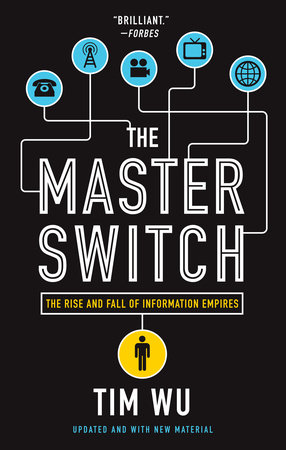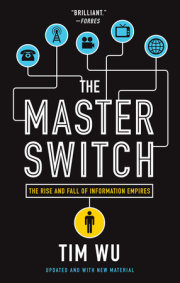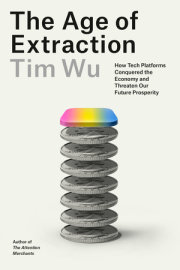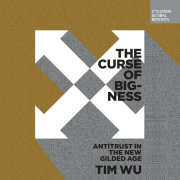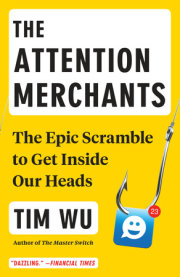Chapter 1
Exactly forty years before Bell's National Geographic banquet, Alexander Bell was in his laboratory in the attic of a machine shop in Boston, trying once more to coax a voice out of a wire. His efforts had proved mostly futile, and the Bell Company was little more than a typically hopeless start-up.
Bell was a professor and an amateur inventor, with little taste for business: his expertise and his day job was teaching the deaf. His main investor and the president of the Bell Company was Gardiner Green Hubbard, a patent attorney and prominent critic of the telegraph monopoly Western Union. It is Hubbard who was responsible for Bell's most valuable asset: its telephone patent, filed even before Bell had a working prototype. Besides Hubbard, the company had one employee, Bell's assistant, Thomas Watson. That was it.
If the banquet revealed Bell on the cusp of monopoly, here is the opposite extreme from which it began: a stirring image of Bell and Watson toiling in their small attic laboratory. It is here that the Cycle begins: in a lonely room where one or two men are trying to solve a concrete problem. So many revolutionary innovations start small, with outsiders, amateurs, and idealists in attics or garages. This motif of Bell and Watson alone will reappear throughout this account, at the origins of radio, television, the personal computer, cable, and companies like Google and Apple. The importance of these moments makes it critical to understand the stories of lone inventors.
Over the twentieth century, most innovation theorists and historians became somewhat skeptical of the importance of creation stories like Bell's. These thinkers came to believe the archetype of the heroic inventor had been over-credited in the search for a compelling narrative. As William Fisher puts it, "Like the romantic ideal of authorship, the image of the inventor has proved distressingly durable." These critics undeniably have a point: even the most startling inventions are usually arrived at, simultaneously, by two or more people. If that's true, how singular could the genius of the inventor really be?
There could not be a better example than the story of the telephone itself. On the very day that Alexander Bell was registering his invention, another man, Elisha Gray, was also at the patent office filing for the very same breakthrough.* The coincidence takes some of the luster off Bell's "eureka." And the more you examine the history, the worse it looks. In 1861, sixteen years before Bell, a German man named Johann Philip Reis presented a primitive telephone to the Physical Society of Frankfurt, claiming that "with the help of the galvanic current, [the inventor] is able to reproduce at a distance the tones of instruments and even, to a certain degree, the human voice." Germany has long considered Reis the telephone's inventor. Another man, a small-town Pennsylvania electrician named Daniel Drawbaugh, later claimed that by 1869 he had a working telephone in his house. He produced prototypes and seventy witnesses who testified that they had seen or heard his invention at that time. In litigation before the Supreme Court in 1888, three Justices concluded that "overwhelming evidence" proved that "Drawbaugh produced and exhibited in his shop, as early as 1869, an electrical instrument by which he transmitted speech. . . ."
There was, it is fair to say, no single inventor of the telephone. And this reality suggests that what we call invention, while not easy, is simply what happens once a technology's development reaches the point where the next step becomes available to many people. By Bell's time, others had invented wires and the telegraph, had discovered electricity and the basic principles of acoustics. It lay to Bell to assemble the pieces: no mean feat, but not a superhuman one. In this sense, inventors are often more like craftsmen than miracle workers.
Indeed, the history of science is full of examples of what the writer Malcolm Gladwell terms "simultaneous discovery"-so full that the phenomenon represents the norm rather than the exception. Few today know the name Alfred Russel Wallace, yet he wrote an article proposing the theory of natural selection in 1858, a year before Charles Darwin published
The Origin of Species. Leibnitz and Newton developed calculus simultaneously. And in 1610 four others made the same lunar observations as Galileo.
Is the loner and outsider inventor, then, merely a figment of so much hype, with no particular significance? No, I would argue his significance is enormous; but not for the reasons usually imagined. The inventors we remember are significant not so much as inventors, but as founders of "disruptive" industries, ones that shake up the technological status quo. Through circumstance or luck, they are exactly at the right distance both to imagine the future and to create an independent industry to exploit it.
Let's focus, first, on the act of invention. The importance of the outsider here owes to his being at the right remove from the prevailing currents of thought about the problem at hand. That distance affords a perspective close enough to understand the problem, yet far enough for greater freedom of thought, freedom from, as it were, the cognitive distortion of what is as opposed to what could be. This innovative distance explains why so many of those who turn an industry upside down are outsiders, even outcasts.
To understand this point we need grasp the difference between two types of innovation: "sustaining" and "disruptive," the distinction best described by innovation theorist Clayton Christensen.
Sustaining innovations are improvements that make the product better, but do not threaten its market. The
disruptive innovation, conversely, threatens to displace a product altogether. It is the difference between the electric typewriter, which improved on the typewriter, and the word processor, which supplanted it.
Another advantage of the outside inventor is less a matter of the imagination than of his being a disinterested party. Distance creates a freedom to develop inventions that might challenge or even destroy the business model of the dominant industry. The outsider is often the only one who can afford to scuttle a perfectly sound ship, to propose an industry that might challenge the business establishment or suggest a whole new business model. Those closer to-often at the trough of- existing industries face a remarkably constant pressure not to invent things that will ruin their employer. The outsider has nothing to lose.
But to be clear, it is not mere distance, but the right distance that matters; there is such a thing as being too far away. It may be that Daniel Drawbaugh actually did invent the telephone seven years before Bell. We may never know; but even if he did, it doesn't really matter, because he didn't do anything with it. He was doomed to remain an inventor, not a founder, for he was just too far away from the action to found a disruptive industry. In this sense, Bell's alliance with Hubbard, a sworn enemy of Western Union, the dominant monopolist, was all-important. For it was Hubbard who made Bell's invention into an effort to unseat Western Union.
I am not saying, by any means, that invention is solely the province of loners and that everyone else's inspiration is suppressed. But this isn't a book about better mousetraps. The Cycle is powered by disruptive innovations that upend once thriving industries, bankrupt the dominant powers, and change the world. Such innovations are exceedingly rare, but they are what makes the Cycle go.
Let's return to Bell in his Boston laboratory. Doubtless he had some critical assets, including a knowledge of acoustics. His laboratory notebook, which can be read online, suggests a certain diligence. But his greatest advantage was neither of these. It was that everyone else was obsessed with trying to improve the telegraph. By the 1870s inventors and investors understood that there could be such a thing as a telephone, but it seemed a far-off, impractical thing. Serious men knew that what really mattered was better telegraph technology. Inventors were racing to build the "musical telegraph," a device that could send multiple messages over a single line at the same time. The other holy grail was a device for printing telegrams at home.
Bell was not immune to the seduction of these goals. One must start somewhere, and he, too, began his experiments in search of a better telegraph; certainly that's what his backers thought they were paying for. Gardiner Hubbard, his primary investor, was initially skeptical of Bell's work on the telephone. It "could never be more than a scientific toy," Hubbard told him. "You had better throw that idea out of your mind and go ahead with your musical telegraph, which if it is successful will make you a millionaire."
But when the time came, Hubbard saw the potential in the telephone to destroy his personal enemy, the telegraph company. In contrast, Elisha Gray, Bell's rival, was forced to keep his telephone research secret from his principal funder, Samuel S. White. In fact, without White's opposition, there is good reason to think that Gray would have both created a working telephone and patented it long before Bell.
The initial inability of Hubbard, White, and everyone else to recognize the promise of the telephone represents a pattern that recurs with a frequency embarrassing to the human race. "All knowledge and habit once acquired," wrote Joseph Schumpeter, the great innovation theorist, "becomes as firmly rooted in ourselves as a railway embankment in the earth." Schumpeter believed that our minds were, essentially, too lazy to seek out new lines of thought when old ones could serve. "The very nature of fixed habits of thinking, their energy-saving function, is founded upon the fact that they have become subconscious, that they yield their results automatically and are proof against criticism and even against contradiction by individual facts."
The men dreaming of a better telegraph were, one might say, mentally warped by the tangible demand for a better telegraph. The demand for a telephone, meanwhile, was purely notional. Nothing, save the hangman's noose, concentrates the mind like piles of cash, and the obvious rewards awaiting any telegraph improver were a distraction for anyone even inclined to think about telephony, a fact that actually helped Bell. For him the thrill of the new was unbeatably compelling, and Bell knew that in his lab he was closing in on something miraculous. He, nearly alone in the world, was playing with magical powers never seen before.
On March 10, 1876, Bell, for the first time, managed to transmit speech over some distance. Having spilled acid on himself, he cried out into his telephone device, "Watson, come here, I want you." When he realized it had worked, he screamed in delight, did an Indian war dance, and shouted, again over the telephone, "God save the Queen!" The Plot to Destroy Bell Eight months on, late on the night of the 1876 presidential election, a man named John Reid was racing from the New York Times offices to the Republican campaign headquarters on Fifth Avenue. In his hand he held a Western Union telegram with the potential to decide who would be the next president of the United States.
The Plot To Destroy Bell
Eight months on, late on the noght of 1876 presidential election, a man named John Reid was racing from the
New York Times offies to the Republican campaign headquarters on Fifth Avenue. In his hand he held a Western Union telegram with the potential to decide who would be the next president of the United States.
While Bell was trying to work the bugs out of his telephone, Western Union, telephony's first and most dangerous (though for the moment unwitting) rival, had, they reckoned, a much bigger fish to fry: making their man president of the United States. Here we introduce the nation's first great communications monopolist, whose reign provides history's first lesson in the power and peril of concentrated control over the flow of information. Western Union's man was one Rutherford B. Hayes, an obscure Ohio politician described by a contemporary journalist as "a third rate nonentity." But the firm and its partner newswire, the Associated Press, wanted Hayes in office, for several reasons. Hayes was a close friend of William Henry Smith, a former politician who was now the key political operator at the Associated Press. More generally, since the Civil War, the Republican Party and the telegraph industry had enjoyed a special relationship, in part because much of what were eventually Western Union's lines were built by the Union army.
So making Hayes president was the goal, but how was the telegram in Reid's hand key to achieving it?
The media and communications industries are regularly accused of trying to influence politics, but what went on in the 1870s was of a wholly different order from anything we could imagine today. At the time, Western Union was the exclusive owner of the only nationwide telegraph network, and the sizable Associated Press was the unique source for "instant" national or European news. (Its later competitor, the United Press, which would be founded on the U.S. Post Office's new telegraph lines, did not yet exist.) The Associated Press took advantage of its economies of scale to produce millions of lines of copy a year and, apart from local news, its product was the mainstay of many American newspapers.
With the common law notion of "common carriage" deemed inapplicable, and the latter-day concept of "net neutrality" not yet imagined, Western Union carried Associated Press reports exclusively.10 Working closely with the Republican Party and avowedly Republican papers like
The New York Times (the ideal of an unbiased press would not be established for some time, and the minting of the
Times's liberal bona fides would take longer still), they did what they could to throw the election to Hayes. It was easy: the AP ran story after story about what an honest man Hayes was, what a good governor he had been, or just whatever he happened to be doing that day. It omitted any scandals related to Hayes, and it declined to run positive stories about his rivals (James Blaine in the primary, Samuel Tilden in the general). But beyond routine favoritism, late that Election Day Western Union offered the Hayes campaign a secret weapon that would come to light only much later.
Hayes, far from being the front-runner, had gained the Republican nomination only on the seventh ballot. But as the polls closed his persistence appeared a waste of time, for Tilden, the Democrat, held a clear advantage in the popular vote (by a margin of over 250,000) and seemed headed for victory according to most early returns; by some accounts Hayes privately conceded defeat. But late that night, Reid, the
New York Times editor, alerted the Republican Party that the Democrats, despite extensive intimidation of Republican supporters, remained unsure of their victory in the South. The GOP sent some telegrams of its own to the Republican governors in the South with special instructions for manipulating state electoral commissions. As a result the Hayes campaign abruptly claimed victory, resulting in an electoral dispute that would make
Bush v. Gore seem a garden party. After a few brutal months, the Democrats relented, allowing Hayes the presidency-in exchange, most historians believe, for the removal of federal troops from the South, effectively ending Reconstruction.
The full history of the 1876 election is complex, and the power of the Western Union network was just one factor, to be sure. But while mostly studied by historians and political scientists, the dispute should also be taken as a crucial parable for communications policy makers. More than anything, it showed what kind of political advantage a discriminatory network can confer. When the major channels for moving information are loyal to one party, its effects, while often invisible, can be profound.
Copyright © 2010 by Tim Wu. All rights reserved. No part of this excerpt may be reproduced or reprinted without permission in writing from the publisher.

